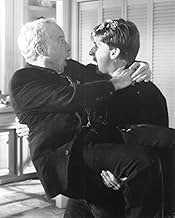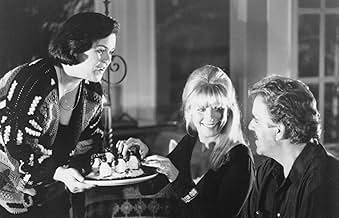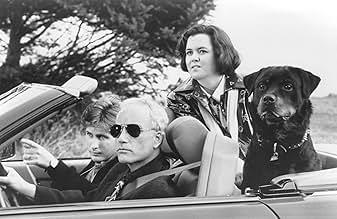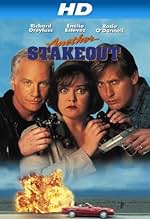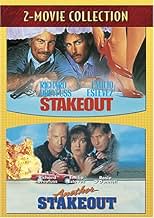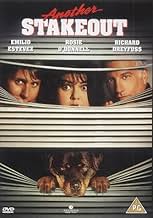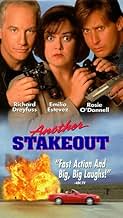CALIFICACIÓN DE IMDb
5.6/10
16 k
TU CALIFICACIÓN
A dos detectives inmaduros se les une una molesta fiscal de distrito para vigilar una casa junto al lago donde se cree que se dirige una testigo vital de un juicio contra la mafia.A dos detectives inmaduros se les une una molesta fiscal de distrito para vigilar una casa junto al lago donde se cree que se dirige una testigo vital de un juicio contra la mafia.A dos detectives inmaduros se les une una molesta fiscal de distrito para vigilar una casa junto al lago donde se cree que se dirige una testigo vital de un juicio contra la mafia.
- Premios
- 1 nominación en total
Gene Ellison-Jones
- Vegas Police Captain
- (as Gene Ellison)
J.R. West
- Vegas Investigator
- (as J. R. West)
Opiniones destacadas
I watched the original Stakeout many times when I was 12 years old. I was 13 by the time the sequel hit the cinemas. I saw it at the now demolished UCI Cinema at Kinnaird Park in early 1994. The fact that it was a PG compared to the R-rated original didn't bother me (I wouldn't have been able to see it otherwise).
Chris and Bill are back, joined by then-closeted Rosie O'Donnell and her big dog. A mob witness may or may not visit old friends for protection on the beautiful Pacific-Northwestern Bainbridge Island. Our heroes are in the house opposite and their sit-and-wait chore is all the more difficult by their new third-wheel partner. The chemistry between Dreyfuss and Estevez is still perfect, and you really get the sense that these guys work together very well. Shame they don't have a lot to do.
The only big fault with Another Stakeout is that all of the action happens at the very beginning and very end, leaving a massive chunk in the middle for bumbling and low-brow amusement. It works, but it feels very underwhelming when compared to the original. For a belated, throw-away sequel it has a surprising amount of continuity with the first film, normally you don't get that. Stylistically however, this is completely different. Where Stakeout was dark, gritty, and rugged Another Stakeout is glossy with high-key anamorphic Panavision photography. Since the rating was lowered I guess it made sense to change the look of the film.
Another Stakeout languishes in a weird gray area. It's more than above average, but never really achieves any kind of greatness, and for that reason I have to rate it lower than the first.
Touchstone licensed the rights for the film to Mill Creek for release on Blu Ray and it's a big step-up from the DVD in terms of AV quality, this time presenting it in the correct 2.35:1 aspect ratio in lovely 1080p. The end credits claim the film was merely in 'Dolby Stereo in Selected Theatres' and the DTS HD-MA 2.0 soundtrack works just fine. There are no extras whatsoever, and the production design of the Blu Ray and the package is really quite poor. But what do you expect for a budget title? At least it doesn't come in a horrible eco-case.
Chris and Bill are back, joined by then-closeted Rosie O'Donnell and her big dog. A mob witness may or may not visit old friends for protection on the beautiful Pacific-Northwestern Bainbridge Island. Our heroes are in the house opposite and their sit-and-wait chore is all the more difficult by their new third-wheel partner. The chemistry between Dreyfuss and Estevez is still perfect, and you really get the sense that these guys work together very well. Shame they don't have a lot to do.
The only big fault with Another Stakeout is that all of the action happens at the very beginning and very end, leaving a massive chunk in the middle for bumbling and low-brow amusement. It works, but it feels very underwhelming when compared to the original. For a belated, throw-away sequel it has a surprising amount of continuity with the first film, normally you don't get that. Stylistically however, this is completely different. Where Stakeout was dark, gritty, and rugged Another Stakeout is glossy with high-key anamorphic Panavision photography. Since the rating was lowered I guess it made sense to change the look of the film.
Another Stakeout languishes in a weird gray area. It's more than above average, but never really achieves any kind of greatness, and for that reason I have to rate it lower than the first.
Touchstone licensed the rights for the film to Mill Creek for release on Blu Ray and it's a big step-up from the DVD in terms of AV quality, this time presenting it in the correct 2.35:1 aspect ratio in lovely 1080p. The end credits claim the film was merely in 'Dolby Stereo in Selected Theatres' and the DTS HD-MA 2.0 soundtrack works just fine. There are no extras whatsoever, and the production design of the Blu Ray and the package is really quite poor. But what do you expect for a budget title? At least it doesn't come in a horrible eco-case.
Having just seen "Another Stakeout" for the first time since 1995, I decided to check out the online info about the locations that were used in the movie and, so far, haven't seen any credit given for the island off the BC coast where most of the filming was done. It was filmed on beautiful Bowen Island, a 15 minute ferry trip from Horseshoe Bay, just to the northwest of Vancouver. The initial scenes involving driving off the ferry were done in Snug Cove (they substituted the name 'Bainbridge Island'), and most of the exterior and interior shots were on the south side of the island in an area called Fairweather where, as you saw or will see in the film, the homes are gorgeous and perfectly suited for the plot (however meager you thought it to be). I've seen a number of comments about the filming having been done on an island in Puget Sound. A lot was shot in Seattle, but the majority was on Bowen Island - I should know - I was living there at the time. Just thought I'd set the record straight. (You can see the homes used for filming clearly on Google Earth, if you're interested.)
"That's it, nobody calls me Ed McMahon!"
"Another Stakeout" was six years in the waiting. After the first film, "Stakeout," made a huge splash at the box office in 1987 (the same year another cop-buddy film came out--can you guess which one?), everyone anticipated an unnecessary--but perhaps funny--sequel that would inevitably result after box office earnings were tallied up by film executives in an office somewhere.
Alas, the six years passed, and we got...this mess?
Richard Dreyfuss and Emilio Estevez reprise their roles as stakeout cops who get paired with a new partner in this watered-down sequel. The new partner is played by Rosie O'Donnell, who is so startlingly unfunny in this it almost makes you involuntarily switch off the television as soon as you see her chubby face smiling at you.
The story starts with a bang--literally--as a trial witness being protected by the CIA is unsuccessfully assassinated--and by that I mean: They die, she lives. What a surprise. (This is the type of scene where the villain is able to blow up a house but the witness just happens to be taking a stroll outside as it happens--or something like that--preventing her from dying along with the other agents who were previously protecting her. This type of thing was spoofed greatly in the truly underrated "Last Action Hero." It's not a joke in "Another Stakeout.") Unfortunately for the United States, the trial witness never returns--she runs away and doesn't let anyone know where she is. Afraid she may be in danger, afraid to lose a star witness, and believing that she might try to contact old friends, the gruff chief of police assigns the unlucky trio of Dreyfuss, Estevez and Donnell to watch the her old pals to see if she turns up.
She eventually does, of course, but first we get some painfully unfunny buddy-buddy moments between Dreyfuss and Estevez and O'Donnell. She brings a bunch of clothing and a dog with her. They don't like it. Har-har. This was used a bit better in "Spaceballs," in which Princess Vespa brought along that entire luggage through the desert (remember?). This is just a copy of that scene, minus the punch line.
Estevez also shaves his mustache, which is supposed to be a type of sacred moment and is referenced at least ten times throughout the film (he goes to stroke his mustache, he complains about chopping it off, Dreyfuss complains about it, etc.). But for heaven's sake, he's only been in one film so far--we've only seen the mustache once--so a better thing to do would have been this: make a few more sequels and, when the last entry comes, have him shave it off. By then the audience realizes that his mustache is part of him, and that losing it is like losing part of his soul.
But I'm glad they didn't make any more than one sequel.
One of the things that kept the "Lethal Weapon" franchise going was the fresh ideas, fresh buddies, and fresh scripts. (Great actors never hurt an action comedy, either.) The "Stakeout" franchise--which didn't even last long enough to spawn more than one sequel--tries to copy this formula but isn't sure how. The introduction of Joe Pesci in "Lethal Weapon 2" was great because he thereby became the Third Stooge, whereas O'Donnell's entry into the series is nothing but a humiliating reminder that talk show hosts can't always act in front of a camera and maintain the same type of humor they may (or may not) exhibit on their (awful) TV "talk show." (Which is, by the way, consumed of entirely staged so-called "interviews.")
And whereas Pesci, as Leo Getz, added a type of silly vibe to the "LW" series, O'Donnell just seems like a carbon copy clone of Estevez from the first "Stakeout." Dreyfuss didn't like him at first, and--guess what--they suddenly became best buds. The same thing happens in the sequel, much to the audience's chagrin.
Of course, "Lethal Weapon" and its sequels were never more than a few years apart (the first coming out in 1989, two years after the original). But "Stakeout" had six years to make a respectable sequel, and it fails. It fails the same way that many prolonged sequels do. But, for once, it's not because the audience has forgotten the original film--it's because the audience is fed up with the same routine.
The film was directed by John Badham, which is surprising, since he's a talented director ("Saturday Night Fever," "The Hard Way," "Stakeout"). Here he jumps through all the hoops, turning his own series into a pale retread of the original--only watered down: minus the violence, language, nudity, and humor. I'm not saying a movie has to be R to be funny. But if you've got a sequel to an R-rated movie like "Stakeout" and you decide to turn its sequel into a cutesy-tutesy children's entertainment program, you'd better advise the audience before they sit down expecting something funny and fresh.
What a disappointment.
2/5 stars.
- Emilio Estevez saying the funniest line from a rather dry sequel
"Another Stakeout" was six years in the waiting. After the first film, "Stakeout," made a huge splash at the box office in 1987 (the same year another cop-buddy film came out--can you guess which one?), everyone anticipated an unnecessary--but perhaps funny--sequel that would inevitably result after box office earnings were tallied up by film executives in an office somewhere.
Alas, the six years passed, and we got...this mess?
Richard Dreyfuss and Emilio Estevez reprise their roles as stakeout cops who get paired with a new partner in this watered-down sequel. The new partner is played by Rosie O'Donnell, who is so startlingly unfunny in this it almost makes you involuntarily switch off the television as soon as you see her chubby face smiling at you.
The story starts with a bang--literally--as a trial witness being protected by the CIA is unsuccessfully assassinated--and by that I mean: They die, she lives. What a surprise. (This is the type of scene where the villain is able to blow up a house but the witness just happens to be taking a stroll outside as it happens--or something like that--preventing her from dying along with the other agents who were previously protecting her. This type of thing was spoofed greatly in the truly underrated "Last Action Hero." It's not a joke in "Another Stakeout.") Unfortunately for the United States, the trial witness never returns--she runs away and doesn't let anyone know where she is. Afraid she may be in danger, afraid to lose a star witness, and believing that she might try to contact old friends, the gruff chief of police assigns the unlucky trio of Dreyfuss, Estevez and Donnell to watch the her old pals to see if she turns up.
She eventually does, of course, but first we get some painfully unfunny buddy-buddy moments between Dreyfuss and Estevez and O'Donnell. She brings a bunch of clothing and a dog with her. They don't like it. Har-har. This was used a bit better in "Spaceballs," in which Princess Vespa brought along that entire luggage through the desert (remember?). This is just a copy of that scene, minus the punch line.
Estevez also shaves his mustache, which is supposed to be a type of sacred moment and is referenced at least ten times throughout the film (he goes to stroke his mustache, he complains about chopping it off, Dreyfuss complains about it, etc.). But for heaven's sake, he's only been in one film so far--we've only seen the mustache once--so a better thing to do would have been this: make a few more sequels and, when the last entry comes, have him shave it off. By then the audience realizes that his mustache is part of him, and that losing it is like losing part of his soul.
But I'm glad they didn't make any more than one sequel.
One of the things that kept the "Lethal Weapon" franchise going was the fresh ideas, fresh buddies, and fresh scripts. (Great actors never hurt an action comedy, either.) The "Stakeout" franchise--which didn't even last long enough to spawn more than one sequel--tries to copy this formula but isn't sure how. The introduction of Joe Pesci in "Lethal Weapon 2" was great because he thereby became the Third Stooge, whereas O'Donnell's entry into the series is nothing but a humiliating reminder that talk show hosts can't always act in front of a camera and maintain the same type of humor they may (or may not) exhibit on their (awful) TV "talk show." (Which is, by the way, consumed of entirely staged so-called "interviews.")
And whereas Pesci, as Leo Getz, added a type of silly vibe to the "LW" series, O'Donnell just seems like a carbon copy clone of Estevez from the first "Stakeout." Dreyfuss didn't like him at first, and--guess what--they suddenly became best buds. The same thing happens in the sequel, much to the audience's chagrin.
Of course, "Lethal Weapon" and its sequels were never more than a few years apart (the first coming out in 1989, two years after the original). But "Stakeout" had six years to make a respectable sequel, and it fails. It fails the same way that many prolonged sequels do. But, for once, it's not because the audience has forgotten the original film--it's because the audience is fed up with the same routine.
The film was directed by John Badham, which is surprising, since he's a talented director ("Saturday Night Fever," "The Hard Way," "Stakeout"). Here he jumps through all the hoops, turning his own series into a pale retread of the original--only watered down: minus the violence, language, nudity, and humor. I'm not saying a movie has to be R to be funny. But if you've got a sequel to an R-rated movie like "Stakeout" and you decide to turn its sequel into a cutesy-tutesy children's entertainment program, you'd better advise the audience before they sit down expecting something funny and fresh.
What a disappointment.
2/5 stars.
- John Ulmer
Before we get started, a little caveat for the reader: this may not be the easiest film to find. Your standard video rental outlets will be hit or miss, as well as libraries. Your best bet will be an online rental service or a strong and fervent prayer. But if you ask me, it is worth it. You may also be scratching your head at the biographical information above. Why should you care about a 1993 sequel to a forgettable buddy cop flick?
Simple. It is a great film. Not only has it obviously influenced many contemporary films, but it also trumps these films on a variety of levels. Allow me to elaborate
Prior to Another Stakeout, John Badham made a handful a good films (Wargames, Short Circuit). Shortly thereafter he helmed an unfortunate number of Hollywood films (American Flyers, Point of No Return) that may be considered guilty pleasures at best. He was also called upon by fellow director Peter Jackson to head up the second unit on all three Lord of the Rings films but declined. So what is the point of this little history lesson? Hollywood kills good directors (John Woo and Sam Raimi, prime examples).
But, I digress. Despite the a lackluster couple of decades, John Badham does have a grand if only marginally well known legacy in Another Stakeout. Science fiction and horror fans will recognize and appreciate the premise; Detective Chris Lecce (Richard Dreyfuss) wakes up one day, goes through the motions like any and every other day, and slowly realizes that he is, inexplicably, on another stakeout. The scenario plays out basically as is expected but it is the manner of the presentation and plotting that make it remarkable.
The film ultimately has only three characters, whose dynamic, touches on Alfred Hitchcock and Shakespeare without any pretense. Chris' subtle and deliberate decline into the reality of his new position in the world leads to him swinging from disbelief to depression to mania to megalomania to acceptance and back to disbelief. The storytelling and character interaction allow for empathy without distraction and the science fiction elements are beautifully woven into the fabric of the drama so that the one doesn't overshadow the other.
There are several mysteries involved in the story that are revealed with wonderful precision by the director through a series of well placed flashbacks and the subtlety of mood and movement, but you'll have to find the film and watch it to understand the full glory.
This is not a flashy film. It is however a master stroke. It is unfortunate that this film has all but vanished into obscurity, along with its director but they both still exist and there's always a second wind. Always.
Simple. It is a great film. Not only has it obviously influenced many contemporary films, but it also trumps these films on a variety of levels. Allow me to elaborate
Prior to Another Stakeout, John Badham made a handful a good films (Wargames, Short Circuit). Shortly thereafter he helmed an unfortunate number of Hollywood films (American Flyers, Point of No Return) that may be considered guilty pleasures at best. He was also called upon by fellow director Peter Jackson to head up the second unit on all three Lord of the Rings films but declined. So what is the point of this little history lesson? Hollywood kills good directors (John Woo and Sam Raimi, prime examples).
But, I digress. Despite the a lackluster couple of decades, John Badham does have a grand if only marginally well known legacy in Another Stakeout. Science fiction and horror fans will recognize and appreciate the premise; Detective Chris Lecce (Richard Dreyfuss) wakes up one day, goes through the motions like any and every other day, and slowly realizes that he is, inexplicably, on another stakeout. The scenario plays out basically as is expected but it is the manner of the presentation and plotting that make it remarkable.
The film ultimately has only three characters, whose dynamic, touches on Alfred Hitchcock and Shakespeare without any pretense. Chris' subtle and deliberate decline into the reality of his new position in the world leads to him swinging from disbelief to depression to mania to megalomania to acceptance and back to disbelief. The storytelling and character interaction allow for empathy without distraction and the science fiction elements are beautifully woven into the fabric of the drama so that the one doesn't overshadow the other.
There are several mysteries involved in the story that are revealed with wonderful precision by the director through a series of well placed flashbacks and the subtlety of mood and movement, but you'll have to find the film and watch it to understand the full glory.
This is not a flashy film. It is however a master stroke. It is unfortunate that this film has all but vanished into obscurity, along with its director but they both still exist and there's always a second wind. Always.
Another Stakeout is a fantastic movie. It's funny and the acting is quite good. Richard Dreyfuss and Emilio Estevez were great together-acting like partners. The house exploding at the beginning was more funny than realistic, it was so long that you could just about go and get a drink and still be back before the end of it. I have seen this film so many times and it is still hilarious every time. It is definitely worth watching on the telly or even hiring it from the video shop. The banter between Dreyfuss and Estevez makes the movie what it is, in other words brilliant. Look out for the conversation about Ren and Stimpy, the bit when Dreyfuss deliberately falls over and says to someone "Frank don't go, you can stay and help me eat", it is so funny. If you haven't seen this film it's you who's lost out. 10/10.
¿Sabías que…?
- TriviaMadeleine Stowe only appears in the film in a cameo role due to scheduling conflicts with "Bad Girls"
- ErroresAt casino, during opening scene, you can clearly hear the worker vacuuming, but the vacuum bag is deflated.
- Citas
Detective Bill Reimers: I've had this moustache for thirteen years. How long have you had yours?
- Bandas sonorasCome On Get Happy
Written by Wes Farrell (as Wes Ferrell) and Danny Janssen
Selecciones populares
Inicia sesión para calificar y agrega a la lista de videos para obtener recomendaciones personalizadas
- How long is Another Stakeout?Con tecnología de Alexa
Detalles
- Fecha de lanzamiento
- País de origen
- Idioma
- También se conoce como
- Stakeout 2
- Locaciones de filmación
- Productoras
- Ver más créditos de la compañía en IMDbPro
Taquilla
- Total en EE. UU. y Canadá
- USD 20,208,496
- Fin de semana de estreno en EE. UU. y Canadá
- USD 5,418,316
- 25 jul 1993
- Total a nivel mundial
- USD 20,208,496
- Tiempo de ejecución1 hora 48 minutos
- Color
- Mezcla de sonido
- Relación de aspecto
- 2.39 : 1
- 2.35 : 1
Contribuir a esta página
Sugiere una edición o agrega el contenido que falta

Principales brechas de datos
By what name was Another Stakeout (1993) officially released in India in English?
Responda

